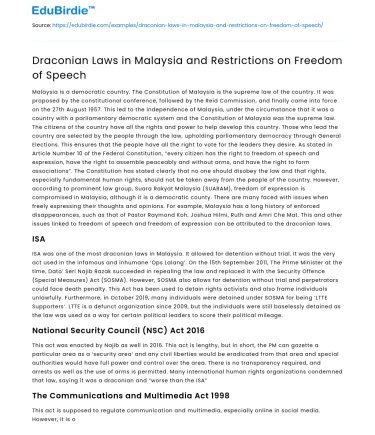Malaysia is a democratic country. The Constitution of Malaysia is the supreme law of the country. It was proposed by the constitutional conference, followed by the Reid Commission, and finally came into force on the 27th August 1957. This led to the independence of Malaysia, under the circumstance that it was a country with a parliamentary democratic system and the Constitution of Malaysia was the supreme law. The citizens of the country have all the rights and power to help develop this country. Those who lead the country are selected by the people through the law, upholding parliamentary democracy through General Elections. This ensures that the people have all the right to vote for the leaders they desire. As stated in Article Number 10 of the Federal Constitution, “every citizen has the right to freedom of speech and expression, have the right to assemble peaceably and without arms, and have the right to form associations”. The Constitution has stated clearly that no one should disobey the law and that rights, especially fundamental human rights, should not be taken away from the people of the country. However, according to prominent law group, Suara Rakyat Malaysia (SUARAM), freedom of expression is compromised in Malaysia, although it is a democratic county. There are many faced with issues when freely expressing their thoughts and opinions. For example, Malaysia has a long history of enforced disappearances, such as that of Pastor Raymond Koh, Joshua Hilmi, Ruth and Amri Che Mat. This and other issues linked to freedom of speech and freedom of expression can be attributed to the draconian laws.
ISA
ISA was one of the most draconian laws in Malaysia. It allowed for detention without trial. It was the very act used in the infamous and inhumane ‘Ops Lalang’. On the 15th September 2011, The Prime Minister at the time, Dato’ Seri Najib Razak succeeded in repealing the law and replaced it with the Security Offence (Special Measures) Act (SOSMA). However, SOSMA also allows for detention without trial and perpetrators could face death penalty. This Act has been used to detain rights activists and also frame individuals unlawfully. Furthermore, in October 2019, many individuals were detained under SOSMA for being ‘LTTE Supporters’. LTTE is a defunct organization since 2009, but the individuals were still baselessly detained as the law was used as a way for certain political leaders to score their political mileage.
Save your time!
We can take care of your essay
- Proper editing and formatting
- Free revision, title page, and bibliography
- Flexible prices and money-back guarantee
National Security Council (NSC) Act 2016
This act was enacted by Najib as well in 2016. This act is lengthy, but in short, the PM can gazette a particular area as a ‘security area’ and any civil liberties would be eradicated from that area and special authorities would have full power and control over the area. There is no transparency required, and arrests as well as the use of arms is permitted. Many international human rights organizations condemned that law, saying it was a draconian and “worse than the ISA”
The Communications and Multimedia Act 1998
This act is supposed to regulate communication and multimedia, especially online in social media. However, it is often seen that this law is impartial towards certain groups. Some are detained for making certain slurs, but others are found not to.
Printing Presses and Publications Act 1984
There are many questionable parts to this act, but one particular eye-catching bit is that, the Home Minister has the provisions to control undesirable publications. Obviously, this law seems important as controversial issues could be prevented. However, this law has been used to silence those who have strong views, which should not be the case.
Official Secrets Act (OSA) 1972
This act involves spreading of information and documents (official secrets). This act is a threat to whistle-blowers who may outline wrongdoings of top officials.
Sedition Act 1948
In the past, there was an uprising of communists in the country. Hence, this law was put in place to control them. However, in today’s context, this act still unfortunately remains and is often misused. This act takes action on situations and individuals who say/ perform ‘seditious’ acts. However, this law is often misused as an easy detaining tool and ‘sedition’ is very vaguely described.
Printing Presses and Publications Act (AMCP) 1984
This law functions as a control towards printed materials such as magazines and newspapers, an act which is seen in the past being used by the government to control opinions through these sources.
Anti-Fake News Act
Before the 14th Malaysian general election (GE14), former prime minister, Najib Razak, enforced a new law to stamp out ‘fake news’, which was the Anti Fake News Act. Those who were suspected or caught publishing ‘fake news’ would be punished or jailed. Najib Razak even went as far as to state that “even spreading bad news about the economy is bad. Fake news would be anything that is not substantive, and dangerous to the economy and security of the nation”.






 Stuck on your essay?
Stuck on your essay?

